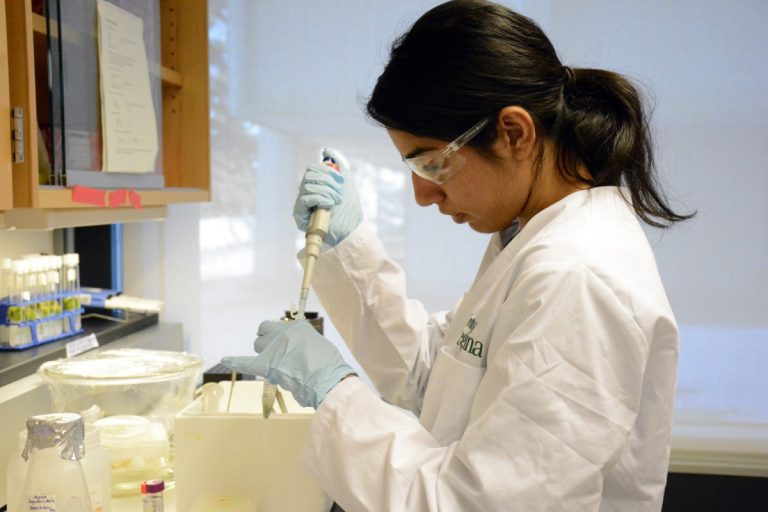
The life sciences encompass the branches of study concerned with the world’s living organisms. While biology is the dominant subject in this field, the life sciences also include botany, zoology, microbiology, physiology, and biochemistry, among many more. At the core of these disciplines sits the desire to improve quality of life through the application of the healthcare, agriculture, medicine and pharmaceutical industries.
This is an ever-evolving and rewarding field to be a part of. Graduates who choose to work in this field stand at the forefront of innovative research, working on scientific breakthroughs and ground-breaking discoveries.
There has never been a more relevant or pressing time to pursue these disciplines, with the pharmaceutical industry presenting fantastic opportunities for entrepreneurial students. In the US alone, pharmaceutical spending is on a steady rise with experts predicting an industrywide value of $610 billion a year by 2021, largely driven by rising demand for prescription medicines, as well as an increase in genetic drugs, niche disease treatments, and earlier detection and treatment of diseases.

Photo by jesse orrico
The increase of spending is also reflective of the jobs market for life science graduates. In the US, the employment of life science occupations like biological technicians, medical scientists, zoologists and wildlife biologists are projected to grow 7 percent by 2024, resulting in around 97,600 new jobs. The median annual wage for these occupations was $63,340 as of May 2016, with biological technicians and medical clinicians commanding exceedingly more.
There are also significant opportunities for life science students to engage with emerging technologies and fresh business ventures. The industry is starting to incorporate new technological advancements in both product creation and manufacturing. Examples of these patient-focused technologies include 3D-printed medicine (Spritam) to increase the ease of digestion, as well as 3D printed prosthetics and other custom medical devices.
Having a life science degree doesn’t just mean you can apply for science-based positions, simply because it offers so many transferrable skills. Roche Diagnostics recently announced the Top 30 Global Life Sciences Employers report for 2017, presenting graduates of the field with a vibrant array of opportunities. While the company holds “a strong focus on life science graduates”, they also offer a range of non-lab-based roles aimed, including Business Development, Partnering, Investor Relations and Communications, just to name a few.
Below are five excellent universities offering high-class life science degrees…
FACULTY OF SCIENCE, UNIVERSITY OF REGINA – SASKATCHEWAN
The University of Regina is a public research institute founded as a college in 1911. Located in Regina, Saskatchewan in the stunning Canadian Prairies, the university’s campus is situated in the beautiful natural landscape of Wascana Centre – one of the largest urban parks in North America.

The Faculty of Science at Regina has a number of departments that cater for students who are in of life science disciplines. The Department of Biology offers several undergraduate programs in Biology and related fields, where students can study a general degree or focus on a specific area. Similarly, the Department of Chemistry and Biochemistry offers a range of exciting undergraduate programmes from Environmental Analytical Chemistry, Biophysics, Biochemistry and Systems Biology, just to name a few. The university also offers a four-year BSc in Environmental Health and Science.
Here, the Faculty of Science is at the forefront of life science research, where the opportunities are extremely broad. Earlier this year the science department research infrastructure received a generous boost to the sum of $900,000, and it would appear the university is putting it to good use. It is this ongoing research by faculty members that highlights the modern entrepreneurial opportunities that exist for life science students.
Recent breakthroughs include: the development of bacterial functional genomics and next-generation DNA sequencing technologies, the development of new synthetic antibiotics for certain drug-resistant pathogens and the developments of new real-time isotope imaging detectors for understanding climate change in the agricultural industry.
FACULTY OF SCIENCE, UNIVERSITY OF NEW BRUNSWICK – FREDERICTON
Founded in 1785, the historic University of New Brunswick is situated on Canada’s east coast, in a beautiful region known for its rivers, pine forests, mountains and whale-watching opportunities.
The Faculty of Science offers prospective life science students the option to study Biology, or a general science degree. The overarching academic aim throughout the department is to provide students with the foundations to go into a professional career in the field (highlighted by the university’s six entrepreneurial centres) or continue to postgraduate study.
With regards to research, the University of New Brunswick is making headlines. The University is home to the world’s first research centre in dermoskeletics, as well as becoming a global leader in powered prosthetic research. Students are encouraged to actively involve themselves in this research and pave the way for new methodologies with a view to gaining prestigious fellowships.

Photo by Drew Hays
COLLEGE OF ARTS AND SCIENCES, TEXAS TECH UNIVERSITY – TEXAS
Founded in 1923, Texas Tech University is located on the South Plains of West Texas in Lubbock, with a campus that boasts stunning Spanish Renaissance architecture throughout.
Within the College of Arts & Sciences the Department of Biological Sciences offers undergraduate students a choice of three BSc degrees; Biology, Cell and Molecular Biology and Microbiology. For students furthering their studies, the university offers a range of Masters Degrees specialising in Zoology, Environmental Toxicology, Microbiology and Environmental Sustainability. A more comprehensive list of courses available can be found here.
Texas Tech University also has an active on-campus research community. The Institute of Environmental and Human Health (TIEHH) actively researches pressing human health and environmental issues of the day, including studies into the effects of mosquitoes and the Zika virus, as well as new materials for cleaning oil spills.
COLLEGE OF NATURAL AND SOCIAL SCIENCES, CALIFORNIA STATE UNIVERSITY (CAL STATE LA) – LOS ANGELES
Situated in the heart of Los Angeles, the world’s entertainment capital, Cal State LA is just five minutes from Downtown LA in the University Hills District. Founded in 1947, this is a public university where last year, 60 percent of Freshmen were first generation students.
The Department for Biological Sciences offers undergraduate students a BSc in Biology or Microbiology. The Bachelor of Science degree in Biology combines core concepts and cutting-edge techniques from areas like molecular, cellular and developmental biology; genetics; ecological and environmental biology.
For entrepreneurial students, the university holds regular events that focus on emerging technology investment opportunities. More recently they hosted a collaboration between the university and public and private sector partners to promote the bioscience industry in the LA region. The university also offers an intensive training program for bioscience entrepreneurs, known as the LA BioStart Bioscience Entrepreneurs Boot Camp (BEBC), which aims to equip graduates with the skills and knowledge needed to start their own ventures post-study.

COLLEGE OF SCIENCE AND TECHNOLOGY, TEMPLE UNIVERSITY – PENNSYLVANIA
Founded in 1894 by Russell Conwell, Temple University is a public four-year Research University in Philadelphia and a national leader in education, healthcare and research.
The College of Science and Technology consists of six departments and three centres for advanced research and education. Undergraduate students can choose from a number of courses that fall under the life sciences umbrella including Biology, Biochemistry, Environmental Science and Neuroscience.
The university was given the title of 8th-best undergraduate school for entrepreneurship, according to The Princeton Review. Students of the College of Science and Technology also find themselves at the forefront of cutting-edge research, understanding how to take these discoveries to the marketplace in order to positively impact people’s lives. There are a number of research institutes for students to choose from listed here.
*Some of the institutions featured in this article are commercial partners of Study International
Liked this? Then you’ll love these…
The new Life Sciences landscape: 5 UK leaders of higher education
6 UK Life Science schools at the forefront of today’s most pressing health issues







